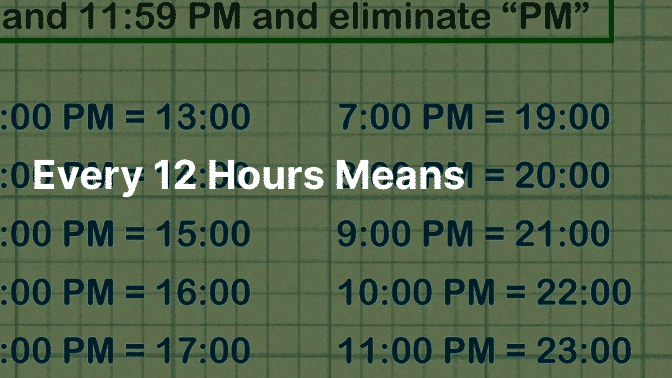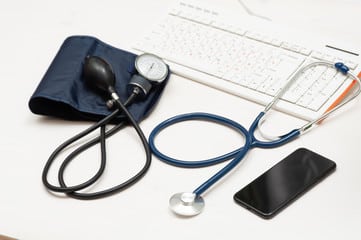The term "every 12 hours" means that a medication should be taken 12 hours apart. For example, if you take medication at 8:00 AM, your next dose should be taken at 8:00 PM. This means that the medication should be taken twice a day, with a 12-hour gap between doses.
Some medications need to be taken every 12 hours in order to maintain a consistent level of the medication in the bloodstream. This is important for medications that treat chronic conditions, such as high blood pressure or diabetes. If the medication level in the bloodstream drops too low, the condition may not be controlled properly.
Other medications need to be taken every 12 hours to prevent side effects. For example, some antibiotics need to be taken every 12 hours to prevent the bacteria from developing resistance to the medication.
Why do some medications need to be taken every 12 hours?
There are a few reasons why some medications need to be taken every 12 hours.
- To maintain a consistent level of the medication in the bloodstream. This is important for medications that treat chronic conditions, such as high blood pressure or diabetes. If the medication level in the bloodstream drops too low, the condition may not be controlled properly.
- To prevent side effects. For example, some antibiotics need to be taken every 12 hours to prevent the bacteria from developing resistance to the medication.
- To allow the body to properly metabolize the medication. Some medications are broken down by the body over a period of time, and taking them every 12 hours helps to ensure that the body has enough time to metabolize the medication and eliminate any excess from the system.
How do I know if I need to take my medication every 12 hours
The best way to know if you need to take your medication every 12 hours is to check the instructions on your medication label. The label will tell you how often you need to take the medication and what time of day you should take it.
If you are not sure how often you need to take your medication, you should talk to your doctor or pharmacist. They will be able to tell you the correct dosage and frequency for your specific medication.
Here are some other things to consider when determining if you need to take your medication every 12 hours:
- The type of medication you are taking. Some medications, such as antibiotics, need to be taken every 12 hours to be effective.
- The condition you are taking the medication for. Some conditions, such as high blood pressure or diabetes, require that the medication be taken at regular intervals to keep the condition under control.
- Your individual needs. Some people may need to take their medication every 12 hours because they have trouble remembering to take it more often.
The side effects of taking medication every 12 hours can vary depending on the specific medication. However, some common side effects include:
- Dizziness
- Drowsiness
- Nausea
- Vomiting
- Headache
- Stomach upset
- Constipation
- Diarrhoea
- Skin rash
If you experience any of these side effects, it is important to talk to your doctor. They may be able to adjust your dosage or recommend a different medication.
In addition to these common side effects, there are some other potential risks associated with taking medication every 12 hours. These risks include:
- Increased risk of side effects. Taking medication more often can increase your risk of experiencing side effects.
- Increased risk of drug interactions. Taking multiple medications every 12 hours can increase your risk of drug interactions.
- Increased risk of overdose. If you take too much medication, you could overdose.
How can I stay on track with my medication schedule?
Staying on track with your medication schedule can be challenging, but it is important to do so in order to get the full benefit of your medication. Here are some tips to help you stay on track:
- Set alarms or reminders. This is one of the most effective ways to stay on track with your medication schedule. You can set alarms on your phone, use a medication reminder app, or ask a family member or friend to remind you to take your medication.
- Create a medication schedule. Write down the name of your medication, the dosage, and the time you need to take it. You can put your medication schedule in a calendar, on a piece of paper, or in a mobile app.
- Keep your medication in a visible place. This will help you remember to take it when it is time. You can keep your medication on your nightstand, in your kitchen, or in your purse or backpack.
- Take your medication at the same time every day. This will help you develop a routine and make it easier to remember to take your medication.
- If you miss a dose, take it as soon as you remember. However, if it is too close to the time for your next dose, skip the missed dose and take your next dose at the regular time.
- Talk to your doctor or pharmacist if you are having trouble remembering to take your medication. They may be able to offer suggestions or recommend a medication reminder app.
Read Also: Why does Pedialyte need to be refrigerated after opening and discarded after 96 hours?
What are some tips for taking medication every 12 hours
Here are some tips for taking medication every 12 hours:
- Set alarms or reminders. This is one of the most effective ways to stay on track with your medication schedule. You can set alarms on your phone, use a medication reminder app, or ask a family member or friend to remind you to take your medication.
- Create a medication schedule. Write down the name of your medication, the dosage, and the time you need to take it. You can put your medication schedule in a calendar, on a piece of paper, or in a mobile app.
- Keep your medication in a visible place. This will help you remember to take it when it is time. You can keep your medication on your nightstand, in your kitchen, or in your purse or backpack.
- Take your medication at the same time every day. This will help you develop a routine and make it easier to remember to take your medication.
- If you miss a dose, take it as soon as you remember. However, if it is too close to the time for your next dose, skip the missed dose and take your next dose at the regular time.
- Talk to your doctor or pharmacist if you are having trouble remembering to take your medication. They may be able to offer suggestions or recommend a medication reminder app.
What are some common mistakes people make when taking medication every 12 hours?
Here are some common mistakes people make when taking medication every 12 hours:
- Forgetting to take their medication. This is the most common mistake, and it can be very serious if it happens too often. If you forget to take your medication, take it as soon as you remember. However, if it is too close to the time for your next dose, skip the missed dose and take your next dose at the regular time.
- Taking their medication at the wrong time. This can also be serious, as it can lead to the medication levels in your body becoming too high or too low. Make sure to take your medication at the same time every day, even on weekends and holidays.
- Taking more or less medication than they are supposed to. This can also be serious, as it can lead to side effects or even overdose. Make sure to take the exact dosage that your doctor has prescribed.
- Not taking their medication with food. Some medications need to be taken with food to be effective. If you don't take your medication with food, it may not work as well.
- Not keeping their medication in a safe place. Children or pets can accidentally take medication if it is not stored properly. Make sure to keep your medication in a safe place where it cannot be accessed by children or pets.
Conclusion
Other medications need to be taken every 12 hours to prevent side effects. For example, some antibiotics need to be taken every 12 hours to prevent the bacteria from developing resistance to the medication.
If you are taking a medication every 12 hours, it is important to be very careful about keeping track of your doses. You should set an alarm on your phone or use a medication reminder app to help you stay on track.



